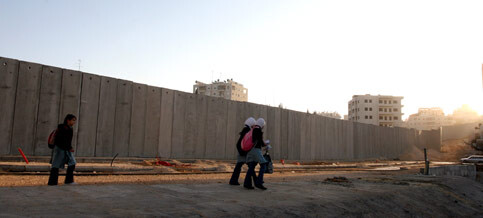Alternative Information Center 8 October 2007

Palestinian students walk next to a section of the wall in the West Bank village of al-Ram north of Jerusalem, February 2007. (Moti Milrod/MaanImages)
The following is the summary of “The Economy of the Occupation 13-15: Report on the Educational System in East,” published by the Alternative Information Center:
When Israel annexed East Jerusalem in 1967, it assumed responsibility for the well-being of East Jerusalem’s population and for fulfilling their rights, regardless of religion or ethnicity. The right to education is one of the most basic rights, and is an essential prerequisite for the plural democracy Israel claims to be.
Education is especially important because in the long term it determines a population’s ability to deal with the rest of society on a par. The education system in Israel maintains and expands gaps between the Jewish and the Palestinian Arab sectors. In East Jerusalem the differences and discrimination are especially stark and apparent.
The economic situation in East Jerusalem is a testament to years of inequity and neglect. Sixty-six percent of Palestinian families and 76 percent of Palestinian children live below the poverty line. While Palestinians make up 34 percent of the total population in Jerusalem, they make up 56 percent of the poor and about 58 percent of poor children, despite the fact that the percentage of Muslim men in Jerusalem employed in the civilian workforce is greater than that of Jews.
While Palestinian school pupils make nearly 42 percent of the pupils in the whole of the Jerusalem education system, they receive little more than 20 percent of the education budget (this figure is provided by the official statistics: the real amount of money that ends up in the hands of the Palestinian schools is even smaller than that). As a result, the infrastructure is hazardous and studying conditions are unbearable in many of the schools.
Classroom density and the ratio of pupils per teacher are alarming and the situation is worsening. Apartments are converted to classrooms, creating unsuitable conditions for teaching. The shortage in classrooms has also led to the adoption of a “double-shift” system, in which many pupils go to school in the afternoon instead of the morning, causing a decline in performance and cutting tuition hours for both shifts.
About 18,000 Palestinian children of school age have dropped out of the education system altogether because of these conditions and due to the lack of resources to supervise their studies and bring them back to school. On top of all this, the separation wall blocks the path of tens of thousands of Palestinian schoolchildren who live east of the city on their daily route to school.
About 14,500 pupils in East Jerusalem are unknown to the Israeli authorities, and as there is no place for them in the official schools, they must make do with private schools that are largely unsupervised and often fail to provide basic learning conditions. The situation is even more critical among children at kindergarten age. Ninety percent of children aged between three to five years receive no kind of preschool education at all.
Even those pupils who succeed in overcoming and pulling through the harsh conditions of the education system are taught a curriculum that is different from the Israeli schooling system and prevents integration of the Palestinian students in Israeli society, higher education and the job market. This policy goes hand in hand with the policy that prevents residents of East Jerusalem from obtaining Israeli citizenship.
In the general picture of the economic aspects and mechanics of the Israeli occupation of the West Bank and the Gaza Strip, the education system of the Palestinian population in East Jerusalem and its many serious problems is only one of many cases that must be addressed and researched, but it is a stark example of the discrimination and inequality that are a direct and intentional result of the Israeli policy towards the Palestinian population since 1967.
The Alternative Information Center, www.alt-info.org, is an Israeli-Palestinian organization which engages in dissemination of information, political advocacy, grassroots activism and critical analysis of the Palestinian and Israeli societies as well as the Israeli-Palestinian conflict. It is one of the oldest NGOs working towards ending the Israeli occupation.